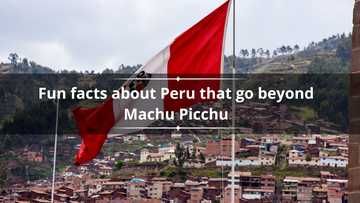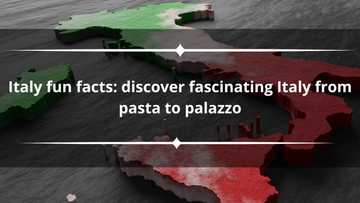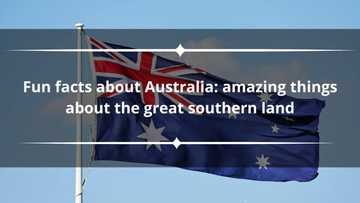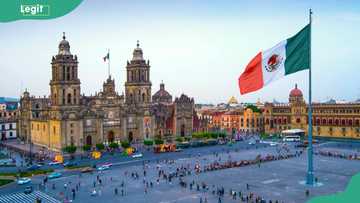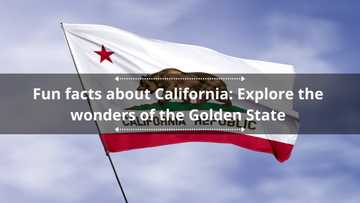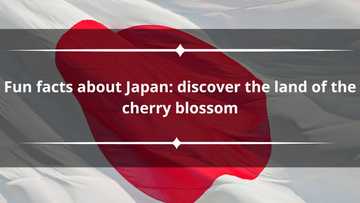30 interesting facts about Spain: Fun things about the land of sun and siesta
Spain is a country in southwestern Europe, bordering France (in the north) and Portugal (in the west). It is a common bucket list destination for most people because of its mountain ranges, beautiful beaches, impressive castles, delicious food, famous landmarks, and rich culture. Discover the most interesting facts about Spain that will leave you in awe.

Source: Getty Images
TABLE OF CONTENTS
- Interesting facts about Spain
- 1. Has the fourth largest number of UNESCO World Heritage Sites
- 2. It is one of the most widely spoken languages in the world
- 3. Spain has the world’s oldest existing lighthouse
- 4. Spain hosts the world's largest food fight
- 5. The country has four official languages
- 6. Spain's national anthem has no words
- 7. The world's first modern novel is Spanish
- 8. The world's oldest restaurant is in Spain
- 9. Spain is the third-largest producer of wine in the World
- 10. The largest Royal Palace in Europe is in Spain
- 11. Spain has a popular culture of ‘Siesta’
- 12. Spain has the most number of Blue Flag beaches in the World
- 13. Spain has a unique festival called “La Rapa das Bestas”
- 14. The world’s third tallest Volcano is in Spain
- 15. Spain produces 40% of the world's olive oil
- 16. Spain is the birthplace of the world's greatest artists
- 17. The country has the highest number of bars per capita
- 18. Spain is the second world’s biggest exporter of strawberries
- 19. Football is a national obsession
- 20. Spain is the birthplace of Flamenco
- 21. Construction of La Sagrada Familia began in 1882
- 22. Madrid is Europe's second-highest capital city
- 23. Spain's national dish is paella
- 24. Spain is on Central European time
- 25. The Moors occupied Spain for 800 years
- 26. Spain is the third-largest producer of saffron
- 27. Spain is home to the world’s largest Gothic Cathedral
- 28. Spanish Culture has a custom of having two surnames
- 29. Tapas originated in Spain
- 30. Spain follows a unique tradition on New Year’s Eve
- What are some of Spain's fun facts for kids?
- What is Spain famous for?
- Where is Spain’s capital?
Spain is a stunning European country with a lot to offer most visitors. From hosting the world’s biggest food fight festival to having four co-official languages, there are so many unexpected yet compelling fun facts about Spain.
Interesting facts about Spain
Are you planning on visiting Spain and would like to learn more about the country before travelling there? Spain is on many travellers' bucket lists due to its vibrant culture, stunning landscapes, and delicious cuisine. Below is a list of interesting facts about Spain you should know.
1. Has the fourth largest number of UNESCO World Heritage Sites
Spain is popular for having the fourth-highest number of UNESCO World Heritage Sites worldwide. As of 2024, Spain has 49 sites, including Alhambra, Park Guell and Sagrada Familia. Of these 49 sites, 43 are cultural, four are natural, and two are mixed.
2. It is one of the most widely spoken languages in the world
Spanish is one of the most commonly spoken languages in the world. More than 486 million people speak Spanish as a native language, making it the second most spoken language by number of native speakers. It is the primary language in 21 countries worldwide.
3. Spain has the world’s oldest existing lighthouse
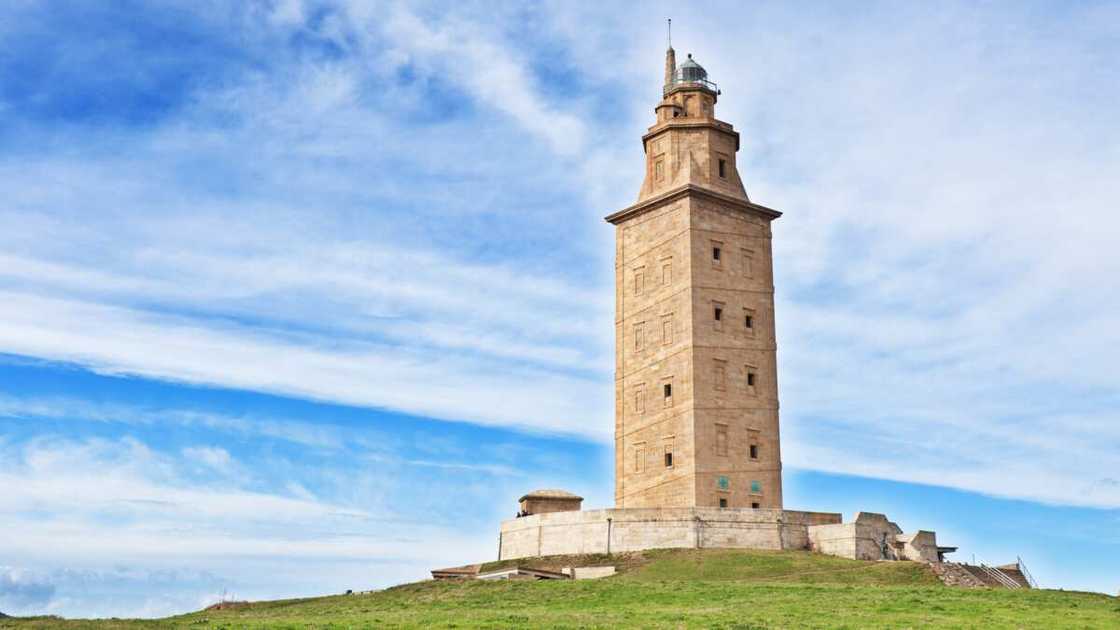
Source: Getty Images
The Tower of Hercules, also known as Hercules' Lighthouse, is the oldest lighthouse in the world that is still operating today. It is located in the Galician city of La Coruña, in Spain. It has become one of the country’s most popular tourist sites because of its outstanding historical value and interest.
4. Spain hosts the world's largest food fight
La Tomatina is a food fight festival held on the last Wednesday of August each year in Buñol, Spain. It involves participants throwing ripe tomatoes at each other. It is reportedly the biggest food fight in the world.
5. The country has four official languages
People in Spain speak mainly four languages, and they are all available in various parts of the country: Spanish (Castilian), Catalan, Galician, and Basque. While Spanish is the most widely spoken language, Catalan is predominant in Catalonia and the Balearic Islands, Galician in Galicia, and Basque in the Basque Country and parts of Navarre.
6. Spain's national anthem has no words
Spain's national anthem, "La Marcha Real" (The Royal March), is one of the few national anthems with no lyrics but only a tune. Even though many different lyrics have been made for it in the past, it has never had official lyrics as a national anthem. Other countries whose national anthem has no words include Bosnia and Herzegovina, San Marino and Kosovo.
7. The world's first modern novel is Spanish
Spain is the birthplace of the world's first modern novel, Don Quixote, written by Miguel de Cervantes. The novel is considered a founding work of Western literature and is often labelled as the first modern novel and the most outstanding work ever written.
8. The world's oldest restaurant is in Spain

Source: Getty Images
According to the Guinness Book of Records, Spain is home to Madrid's world's oldest restaurant, Sobrino de Botín. The restaurant was founded in 1725 by Frenchman Jean Botin and his wife and was originally called Casa Botín. It has been serving traditional Spanish cuisine for over three centuries.
9. Spain is the third-largest producer of wine in the World
Spain is the world's third largest wine producer, behind Italy and France. It has been making wine for a long time, dating back to 1100 BC when Phoenicians settled in Cádiz. Spain has over 1.2 million hectares (3.0 million acres) planted in wine grapes.
10. The largest Royal Palace in Europe is in Spain
The Royal Palace of Madrid is one of Europe's largest royal palaces. The palace has 135,000 m2 (1,450,000 sq ft) of floor space and 3,418 rooms. It is the official residence of the Spanish royal family but is currently used only for state ceremonies.
11. Spain has a popular culture of ‘Siesta’
The siesta in Spain is a famous tradition which consists of a short nap, usually 15-30 minutes. It originated from the need to escape the sun in the hot afternoon. This cherished custom is still observed in many parts of Spain, adding to the country's relaxed pace of life.
12. Spain has the most number of Blue Flag beaches in the World
Spain boasts the world's largest number of Blue Flag beaches, with over 600 pristine shores. The country won a Guinness World Record in 2022 for the most Blue Flag beaches and has held the record for two consecutive years. These beaches are considered the cleanest and most beautiful beaches out of all.
13. Spain has a unique festival called “La Rapa das Bestas”
''LA Rapa Das Bestas,” which translates into “shearing of the beasts'', is a festival held in La Estrada region, Pontevedra, on the first weekend of July. This festival comprises a noble confrontation between man and horse. It is celebrated by rounding up wild horses from the mountains, herding them into a coral and shearing their manes and tails.
14. The world’s third tallest Volcano is in Spain
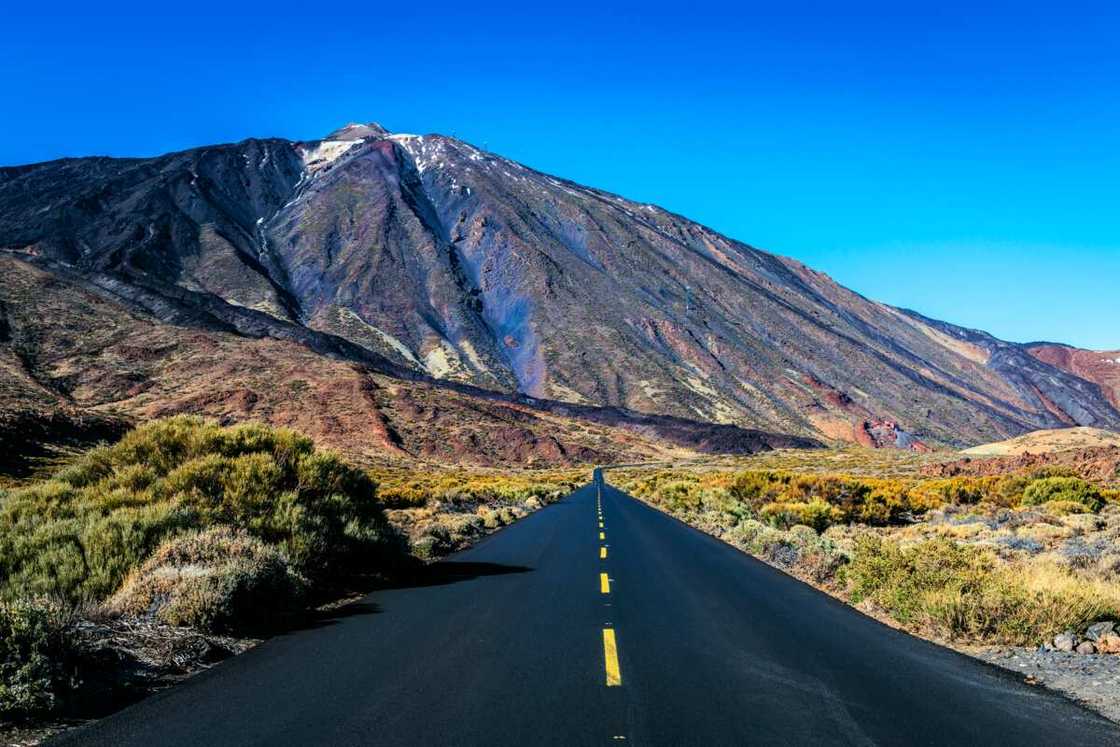
Source: Getty Images
Teide, or Mount Teide, is a volcano in Tenerife in the Canary Islands, Spain. It is 3,718 meters tall and is the third-highest volcano in the world. Rising 7,500 m above the ocean floor, UNESCO and NASA rank it as Earth's third-tallest volcanic structure.
15. Spain produces 40% of the world's olive oil
Spain is the world's largest oil producer. It produces approximately 40 per cent of global production, almost half of the world's olive oil. Other large producers are Italy, Greece, Portugal, Tunisia, Turkey and Morocco.
16. Spain is the birthplace of the world's greatest artists
Spanish art is one of the largest cultural heritages in the world. Spain has more than 1,500 museums, which exhibit works from every age and in every art style. Spanish painters such as Diego Velázquez, Francisco Goya, Joan Miró, and Pablo Picasso have left their mark on the history of world art.
17. The country has the highest number of bars per capita
Spain holds the European record for being home to the most bars per inhabitant compared to other European Union countries, with one bar for every 175 people.
18. Spain is the second world’s biggest exporter of strawberries
With around 300 million kilograms of strawberry production annually, Spain exports 90% of the total produce. The most commonly grown strawberry cultivar in Spain is the Camarosa.
19. Football is a national obsession
Football is a widespread passion among the people of Spain and is the most popular sport in the country. The country is home to one of the most popular football clubs, Barcelona and Real Madrid. These teams have attracted millions of fans globally with thrilling matches and storied rivalries.
20. Spain is the birthplace of Flamenco
Flamenco is a passionate and expressive form of Spanish music and dance. Originating from the Andalusian Roma of southern Spain, it combines singing, guitar playing, dance, and handclaps.
21. Construction of La Sagrada Familia began in 1882
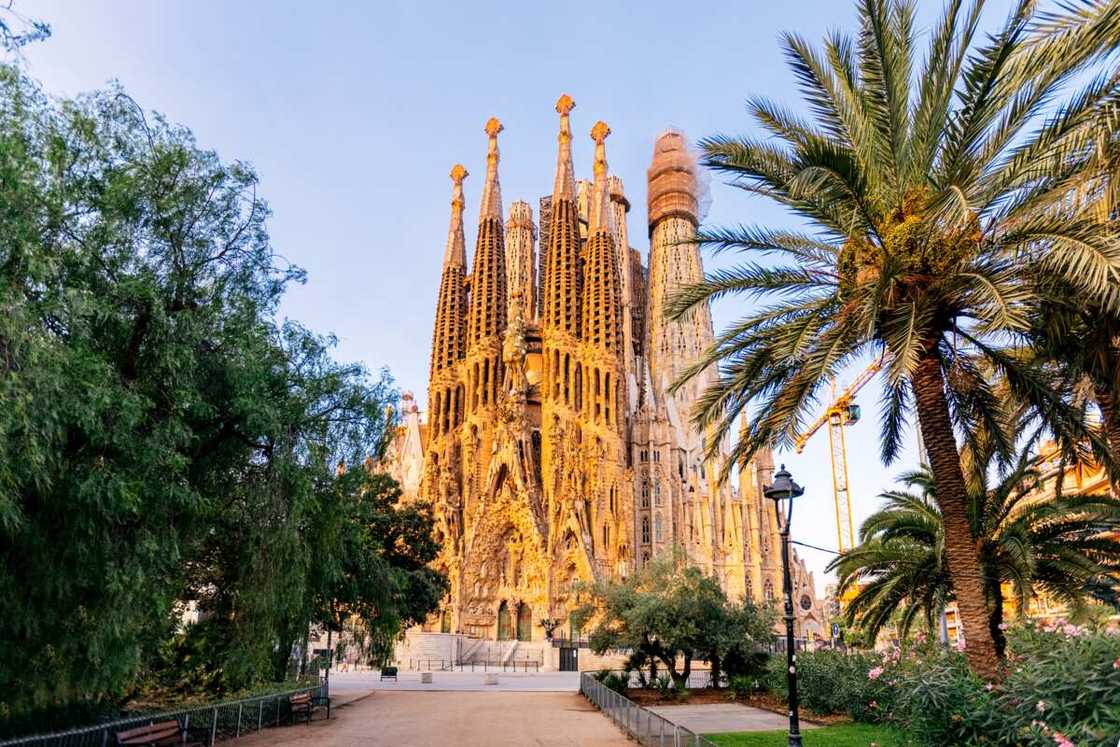
Source: Getty Images
Sagrada Família is a church under construction in the Eixample district of Barcelona, Catalonia, Spain. It is the largest unfinished Catholic church in the world. Construction began on 19 March 1882 under architect Francisco de Paula del Villar. The church's ongoing construction mesmerises visitors with its intricate facades and soaring towers.
22. Madrid is Europe's second-highest capital city
Standing at an impressive altitude of 650 m (2,130 ft), Madrid is the second highest capital of Europe, after Andorra la Vella. The city has almost 3.4 million inhabitants and a metropolitan area population of around 7 million.
23. Spain's national dish is paella
Paella originated in Valencia and is a popular and iconic Spanish dish made with rice, saffron, various meats, seafood, and vegetables. People may add chicken, seafood, or vegetables to create variations.
24. Spain is on Central European time
Central European Time (CET) is the standard time in Central and parts of Western Europe. It is one hour ahead of Coordinated Universal Time (UTC). Spain has the same time as CET.
25. The Moors occupied Spain for 800 years
Moors is a term Europeans use to describe the Muslim people of North Africa and the Iberian Peninsula during the Middle Ages. The Moors ruled Spain for 800 years and introduced new scientific techniques to Europe, such as an astrolabe, a device for measuring the position of the stars and planets. They also introduced various crops, such as citrus fruits and rice.
26. Spain is the third-largest producer of saffron
Spain is the third-largest producer of saffron, one of the most expensive spices worldwide. Spain grows Creme and Spanish superior varieties of saffron that are mild in flavour and aroma. Iran is the largest and world’s most famous saffron producer.
27. Spain is home to the world’s largest Gothic Cathedral
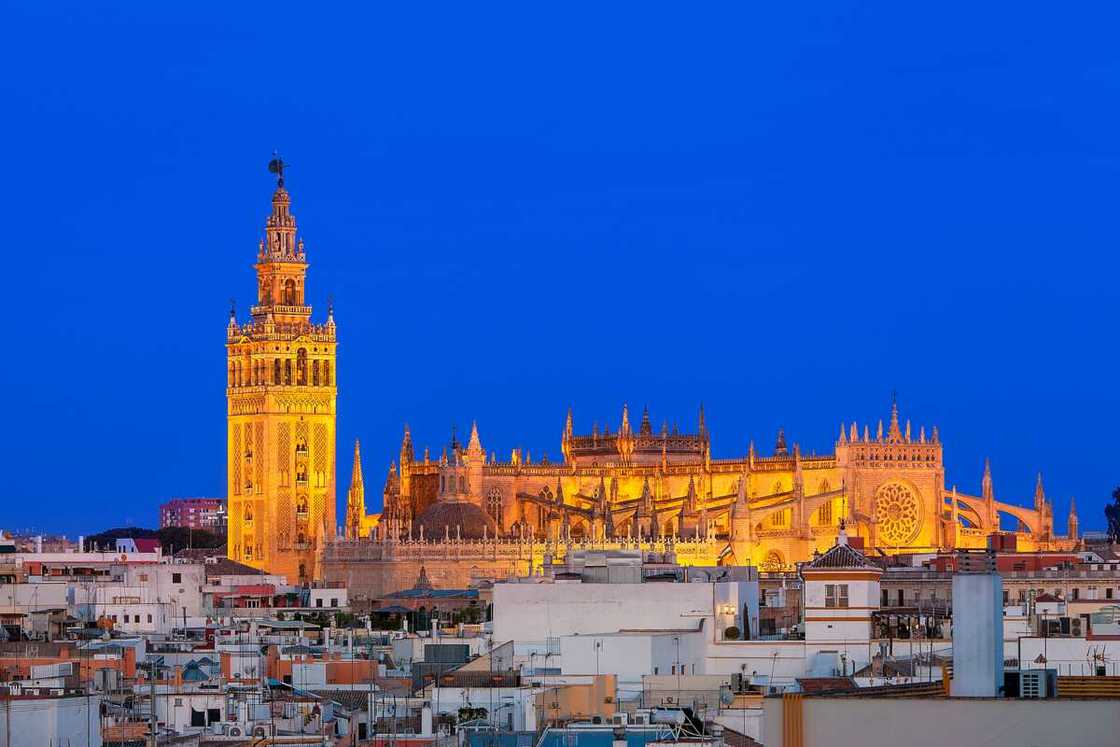
Source: Getty Images
The Cathedral of Saint Mary of the See, also known as Seville Cathedral, is one of the world's largest and most Gothic churches. It is a Catholic cathedral and former mosque. UNESCO recognises it as a world heritage site and is famous as the final resting place of Christopher Columbus.
28. Spanish Culture has a custom of having two surnames
In Spanish culture, people have two surnames instead of one. The first is the father’s surname, while the second is the mother’s surname. Both surnames are used in legal documentation.
29. Tapas originated in Spain
Tapas, the Spanish practice of drinking with accompanying small plates of various food, originated in Andalucia, a Southern province of Spain. Streets like Cava Baja, Cava Alta and Humilladeros are home to some of the most historic tapas.
30. Spain follows a unique tradition on New Year’s Eve
Probably the most iconic New Year's Eve tradition in Spain is to eat 12 grapes, one per stroke of the clock at midnight. This unique tradition is believed to bring people good luck and charm in the coming year.
What are some of Spain's fun facts for kids?
Spain is famous for its colourful festivals, including La Tomatina, where people throw tomatoes at each other for fun. The country is home to many beautiful beaches with over 8,000 kilometres of coastline.
What is Spain famous for?
Spain is famous for its rich cultural heritage, including flamenco dance, bullfighting, and historic landmarks like the Alhambra and Sagrada Familia. It's also renowned for its delicious cuisine, sunny weather, and passionate football culture.
Where is Spain’s capital?
Madrid is Spain's capital, located in the centre of the country. It is the largest city and the nation's political, cultural, and economic hub.
What is Spain's population?
Spain's population is approximately 47.5 million as of 2024. This number can vary slightly depending on the source and the time of year.
From the world’s oldest restaurant to the highest volcano, you probably did not know the above interesting facts about Spain. Spain is a superb blend of sun, delicious food, and fascinating history.
Legit.ng published an article about fun facts about Texas. Texas is an American state located in the southern part of the country. It borders Mexico and is rich in culture, history, and cuisine. You can enjoy numerous fun facts about Texas with your loved ones.
Texas is a famous state, also known as the Lone Star State. It is a vast land with numerous attraction sites and diverse people. The state has a rich political history and is among the best travel destinations. Discover more interesting facts about this state if you want to visit or relocate.
Source: Legit.ng


